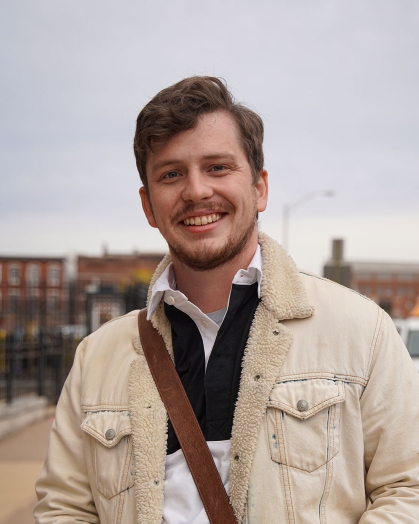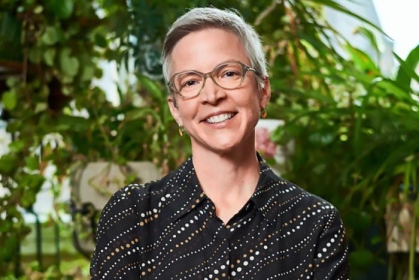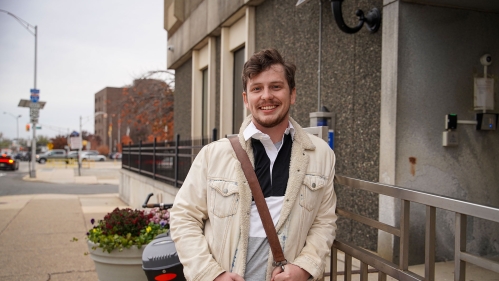As Adam Colgate earned his degree, health challenges helped him see new sides of his professors and classmates
When Adam Colgate was diagnosed with cancer in November 2023, it was not the first time a health challenge had drastically altered the course of his life. Years earlier, while living on North Carolina’s Outer Banks, Colgate survived a sudden brush with death that eventually set him on the path to attend Rutgers University–Camden.
“I was eating peaches—something I had done all the time without a problem—when I had a severe allergic reaction and had to be evacuated off the island,” Colgate recalled. “On the way to the hospital, I thought I was going to die and that this was where my story ended. I hadn’t really done anything for anyone. I partied myself to death, and that was it.”
After the incident, the Haddon Heights, New Jersey native pondered his next move. An avid guitarist and theater performer, he had set out to build a career as a musician and songwriter, believing he had no use for a college degree. But with his mother having recently returned to school and his two older brothers having previously attended Rutgers–Camden, the possibility re-entered his mind.
“I didn’t always envision myself going to college when I was young, but when I did, I thought about coming here,” Colgate said.
This month, Colgate is graduating from Rutgers-Camden with a bachelor’s degree in political science and a minor in history, reaching a key milestone in his nontraditional higher-education journey. Along the way, support from faculty mentors and the campus community allowed him to rediscover his love of learning even as he dealt with the impacts of cancer. He plans to walk in the commencement ceremony this spring.
Following his near-fatal allergic reaction, Colgate was determined to make the most of his second chance, enrolling at Camden County College with the intention to transfer to Rutgers–Camden. While his love of music and performance remained, another field of study was calling his name: political science.
“I grew up in a house that talked about politics and history,” Colgate said. “My father is a Teamster, and he and my grandfather are both members of the International Union of Bricklayers and Allied Craftworkers, so unions and labor were common topics for us.”
Colgate completed his two years of community college and enrolled at Rutgers–Camden as a junior. Despite his progress, he came to campus still unsure if he would stay long enough to earn his degree. That quickly changed with the help of faculty from the Departments of Political Science and History.

“Once I got to Rutgers–Camden, my imposter syndrome really subsided,” Colgate said. "My first day on campus, I had political science classes with Professors Tim Knievel and Anthony Grasso. I was so impressed with the lectures, and I felt very confident I would get a great education here. I could tell I was surrounded by people who cared about students.”
The Rutgers–Camden experience proceeded smoothly for Colgate until August 2023, when he could tell something was not right with his health. Having just turned 26, he no longer had health insurance, so he had no choice but to wait for a diagnosis.
“I was able to get insurance through school, and in November 2023, I was diagnosed with cancer,” Colgate said. “My professors were incredible in their response—not just as educators, but as people. They let me put on the brakes, and I got an extension to finish the semester. They went the extra mile to check in and make sure I was doing well with my health. The coursework could come later.”
Colgate underwent surgery, and, not a candidate for chemotherapy, required invasive scans that tracked the progression of his health every three months. Even when he was ready to return to campus, his health challenges were not over, and it was clear that his experience as a student would be different.
“After surgery, I wasn’t able to carry anything over ten pounds, so I got an accommodation from the Office of Disability Services (ODS) to have all of my books digitally on my laptop,” Colgate said. It seems like such a small thing—and for the ODS folks, it’s just another part of the workweek, but it made such a tremendous difference.”
Colgate found that his studies distracted him from the ever-present anxieties that accompany cancer treatment. In addition to his classes, he frequently attended History Club meetings and made use of the Chancellor’s Experiential Learning Fund to take on a research project with Knievel, an assistant teaching professor in the Department of Political Science, on the use of artificial intelligence in government institutions.
“Having coursework to focus on was actually an important outlet,” Colgate said. “I try to share good energy, because when I was struggling, little brushes with people on campus—like someone asking how my day was—were so important.”
Colgate’s Rutgers–Camden journey has left him with multiple faculty mentors. His perseverance in the face of obstacles caught the attention of his instructors, earning praise from across academic disciplines.

“I cannot fully express how exceptional Adam is as a student and a person,” said Wendy Woloson, professor in the Department of History. “I was one of Adam’s instructors and served as a resource when he came to me with his personal challenges. It is important to give students space to discuss their emotions, and I am delighted that Adam has navigated those challenges to achieve his goal of earning a degree.”
Just over a year after his diagnosis, Colgate has completed the coursework required for graduation and—even more importantly—responded positively to treatment, hitting all the milestones needed for a clean bill of health. Before he walks in Rutgers–Camden’s May 2025 Commencement ceremony, Colgate will confront yet another challenge: the LSATs, which he will doubtlessly approach with characteristic grace and positivity.
I want to build a more compassionate future. The past couple years have presented so many challenges, but I’ve learned that even the steps backwards are part of the dance. You can find your rhythm by leaning on others and getting through it together.
Adam Colgate



